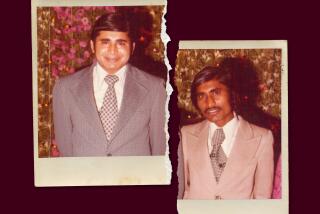A wife’s memories come to the defense of a shah
- Share via
Reading Farah Pahlavi’s staunch, forthright and compelling memoir, “An Enduring Love: My Life With the Shah,” I kept thinking of a remark made to me by a neighbor who had fled Iran after the Islamic Revolution a quarter century ago. The corruption of the shah’s regime was bad, he said, but the fanaticism that followed was far worse, indeed intolerable.
Pahlavi, widow of the Shah of Iran, concedes that there was corruption under her husband’s regime and that his secret police used unacceptable methods, but readers looking for tough criticisms of Shah Mohammad Reza Pahlavi’s rule should not be surprised that this is not the place to find them. In her view, his regime, whatever its faults, was essentially a progressive one. “Yes,” she writes, “I considered myself a soldier of the revolution because I believed with all my strength that the path mapped out by my husband was the right one.”
She goes on to list some features of his benign “revolution”: agrarian reform; privatization of some state industries; profit-sharing for workers in companies; and, above all to Pahlavi -- who, like her own remarkable mother, was a feminist -- the right of women to vote and to participate in government. Indeed, Pahlavi herself was designated regent in the event of her son being too young to rule, something she understandably sees not only as a point of personal pride but also as a tribute to her gender. In exile she got to fill this position for a few months after her husband’s death, although it would seem from reading her dignified but heartbroken account of this episode that she found it a painful and difficult task.
A Shiite Muslim, Pahlavi is clearly a deeply religious person -- this is evident throughout the book -- but she is also a woman of her times who values science and the social sciences and has herself benefited from the insights of psychology.
She believes with all her heart in progress and has learned the hard way the difficulties of modernizing a society riddled with both religious fanaticism and revolutionary Marxism. She speaks movingly of a childhood brush with Muslim fundamentalism: “Because my hair was not entirely covered, a mullah shouted at me angrily, ‘Hide your hair, or you will go to hell!’ I’ve never been able to forget the fear that that man’s intolerance made me feel, a fear that the Ayatollah Khomeini would revive thirty years later.”
Although she and her immediate family would themselves fortunately be spared the revolutionary tumbrels, she would taste at second hand the poisonous fruit of that intolerance run wild: “I had known Mrs. [Farrokhrou] Parsa [minister for national education under the shah]
Pahlavi argues, convincingly enough, that the authoritarian excesses and economic injustices of her husband’s regime were no worse than those found in most other developing countries. She is on even stronger ground in pointing to the hypocrisy of nations and rulers who fawned over the shah when he was in power only to drop him or worse in exile. (Indeed, if the shah’s regime was so rebarbative to the international community, why was it content to have his twin sister serve as head of the U.N. Commission on Human Rights in the 1970s?)
The juxtaposition of President Jimmy Carter’s fulsome praise on a stop in Tehran at the end of 1977 -- “Iran, whose destiny is so remarkably well guided by the shah, is an island of stability.... That is a great tribute to you, Your Majesty, and to the great task that you are accomplishing in Iran.... There is no other head of state with whom I feel on friendlier terms and to whom I feel more gratitude” -- with the twists and turns of his discreditable treatment of a mortally ill exile makes for sickening reading. Pahlavi evokes with dignity and passion her feelings of mingled despair, anger and fear in those awful months between leaving Iran in January 1979 and her husband’s death the next year. Her tribute to the late Egyptian president Anwar Sadat and his wife is heartfelt and richly deserved; it is good to be reminded that there were still some public figures who were capable of showing statesmanlike courage and kindness on a human level.
Pahlavi now divides her time between Paris and the United States. “Enduring Love” was written in French and has been well-translated into a flowing, colloquial voice that seems authentic in emotion and tone alike. Those readers who admired Jehan Sadat’s memoirs some years back are likely to enjoy hearing from another devoted wife proud of the husband whom she believes did much good before his tragic death. The shah emerges from these admittedly partial pages as a fond husband and father and an enlightened and thoughtful ruler. There can be little doubt from them too that he found in this third and last wife a loyal and devoted helpmeet.
More to Read
Sign up for our Book Club newsletter
Get the latest news, events and more from the Los Angeles Times Book Club, and help us get L.A. reading and talking.
You may occasionally receive promotional content from the Los Angeles Times.







